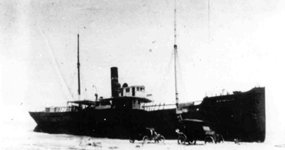
From the Padre Island National Seashore archives Almost everyone has probably heard stories of 19th century "wreckers" on the island. The popular version is that these were men who lived on Padre and Mustang Islands and made their living by luring ships to wreck on the island by suspending lanterns from burros, which they walked along the beach. Ships would see the swaying lights, and thinking it was another ship that was heading through a channel to Corpus Christi, and would follow it hoping for safe passage. When the ship ran aground, the wreckers would either wait until the crew abandoned the ship and then would board it and steal what they wanted, or they would simply board it and hold the crew at gunpoint while the wreckers took what they wanted. These men were often referred to as "sand pirates". History records only one man on Padre Island as having been a wrecker. His name was Mr. Tilley and he lived on the island in the 1840s. Probably only because of the sensational nature of his work, the pirate-wrecker receives more attention in the history books and in legends than his legitimate counterpart. The average wrecker was probably just another working man or someone trying to make some additional income. In fact, for many decades, because of the frequency of ships running aground during storms or for navigation errors, wrecking was an industry in South Texas. During the 1800s, Nueces County government had a office with the official title of "Wreckmaster". His job was to pay men to salvage whatever possible from a wreck, and bring it into Corpus Christi, where it would be sold at auction and the proceeds would go to the rightful owner of the vessel. The County kept a small percentage of the money from the sales to pay for expenses. In the Local History section of the Corpus Christi Main Library are several receipts on file detailing how the Wreckmaster paid wreckers for their work on Mustang Island. However, there is only one record for Padre Island: a ledger page detailing the expenses involved in salvaging the wreck of the schooner Ben Jones. Unfortunately, no mention is made of where on the island the schooner wrecked. The transactions involved took place over several days in January and February 1879 after the schooner apparently wrecked in the beginning of January. There are receipts for stripping the Ben Jones's hull, transporting the salvaged parts to Corpus Christi, and the sale of individual parts (one flying jib $5, one hawser $8, one skiff $9, etc.). The entire process was overseen by the county Wreckmaster Peter Benson, witnessed in writing by a notary public, and certified and signed off by a county judge. The park's and state's outside estimate of the number of ships that have run aground on Padre Island during its history is around four hundred. No doubt, the reason we can find so few remains of the ships is because of the work of the wreckers, both legal and illegal. Most of the little they did not take has probably been scooped up by modern-day treasure hunters armed with metal detectors. Please help us preserve the island's history by not taking anything of potential archeological value from the park. Report your finds to the Malaquite Visitor Center or to the nearest law enforcement officer. In return, the park will present you with a certificate to commemorate your find and donation.
|
Last updated: February 24, 2015
